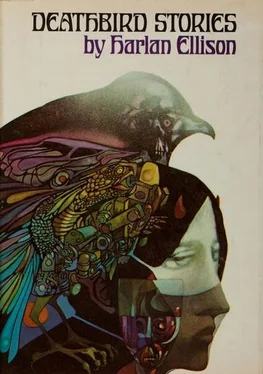The flight seemed endless, interminable, he knew it was taking longer than necessary.
Customs, even with high government clearances (all masterpieces of forgery) and bribes, seemed to be drawn out sadistically by the mustachioed trio of petty officials; secure, and reveling in their momentary power.
The overland facilities could not merely be called slow. They were reminiscent of the Molasses Man who cannot run till he’s warmed-up and who, when he’s warmed-up, grows too soft to run.
Expectedly, like the most suspenseful chapter of a cheap gothic novel, a fierce electrical storm suddenly erupted out of the mountains when the ancient touring car was within a few miles of Talbot’s destination. It rose up through the steep mountain pass, hurtling out of the sky, black as a grave, and swept across the road obscuring everything.
The driver, a taciturn man whose accent had marked him as a Serbian, held the big saloon to the center of the road with the tenacity of a rodeo rider, hands at ten till and ten after midnight on the wheel.
“Mister Talbot.”
“Yes?”
“It grows worse. Will I turn back?”
“How much farther?”
“Perhaps seven kilometer.”
Headlights caught the moment of uprootment as a small tree by the roadside toppled toward them. The driver spun the wheel and accelerated. They rushed past as naked branches scraped across the boot of the touring car with the sound of fingernails on a blackboard. Talbot found he had been holding his breath. Death was beyond him, but the menace of the moment denied the knowledge.
“I have to get there.”
“Then I go on. Be at ease.”
Talbot settled back. He could see the Serb smiling in the rearview mirror. Secure, he stared out the window. Branches of lightning shattered the darkness, causing the surrounding landscape to assume ominous, unsettling shapes.
Finally, he arrived.
The laboratory, an incongruous modernistic cube—bone white against the—again—ominous basalt of the looming prominences—sat high above the rutted road. They had been climbing steadily for hours and now, like carnivores waiting for the most opportune moment, the Carpathians loomed all around them.
The driver negotiated the final mile and a half up the access road to the laboratory with difficulty: tides of dark, topsoil-and-twig-laden water rushed past them.
Victor was waiting for him. Without extended greetings he had an associate take the suitcase, and he hurried Talbot to the subground-floor theater where a half dozen technicians moved quickly at their tasks, plying between enormous banks of controls and a huge glass plate hanging suspended from guy-wires beneath the track-laden ceiling.
The mood was one of highly charged expectancy; Talbot could feel it in the sharp, short glances the technicians threw him, in the way Victor steered him by the arm, in the uncanny racehorse readiness of the peculiar-looking machines around which the men and women swarmed. And he sensed in Victor’s manner that something new and wonderful was about to be born in this laboratory. That perhaps …at last…after so terribly, lightlessly long…peace waited for him in this white-tiled room. Victor was fairly bursting to talk.
“Final adjustments,” he said, indicating two female technicians working at a pair of similar machines mounted opposite each other on the walls facing the glass plate. To Talbot, they looked like laser projectors of a highly complex design. The women were tracking them slowly left and right on their gimbals, accompanied by soft electrical humming. Victor let Talbot study them for a long moment, then said, “Not lasers. Grasers. Gamma Ray Amplification by Stimulated Emission of Radiation. Pay attention to them, they’re at least half the heart of the answer to your problem.”
The technicians took sightings across the room, through the glass, and nodded at one another. Then the older of the two, a woman in her fifties, called to Victor.
“On line, Doctor.”
Victor waved acknowledgment, and turned back to Talbot. “We’d have been ready sooner, but this damned storm. It’s been going on for a week. It wouldn’t have hampered us but we had a freak lightning strike on our main transformer. The power supply was on emergency for several days and it’s taken a while to get everything up to peak strength again. “
A door opened in the wall of the gallery to Talbot’s right. It opened slowly, as though it was heavy and the strength needed to force it was lacking. The yellow baked enamel plate on the door said, in heavy black letters, in French, PERSONNEL MONITORING DEVICES ARE REQUIRED BEYOND THIS ENTRANCE. The door swung fully open, at last, and Talbot saw the warning plate on the other side:
CAUTION RADIATION AREA
There was a three-armed, triangular-shaped design beneath the words. He thought of the Father, the Son, and the Holy Ghost. For no rational reason.
Then he saw the sign beneath, and had his rational reason: OPENING THIS DOOR FOR MORE THAN 30 SECONDS WILL REQUIRE A SEARCH AND SECURE.
Talbot’s attention was divided between the doorway and what Victor had said. “You seem worried about the storm.”
“Not worried,” Victor said, “just cautious. There’s no conceivable way it could interfere with the experiment, unless we had another direct hit, which I doubt—we’ve taken special precautions—but I wouldn’t want to risk the power going out in the middle of the shot.”
“The shot?”
“I’ll explain all that. In fact, I have to explain it, so your mite will have the knowledge.” Victor smiled at Talbot’s confusion. “Don’t worry about it.” An old woman in a lab smock had come through the door and now stood just behind and to the right of Talbot, waiting, clearly, for their conversation to end so she could speak to Victor.
Victor turned his eyes to her. “Yes, Nadja?”
Talbot looked at her. An acid rain began falling in his stomach.
“Yesterday considerable effort was directed toward finding the cause of a high field horizontal instability, “ she said, speaking softly, tonelessly, a page of some specific status report. “The attendant beam blowup prevented efficient extraction.” Eighty, if a day. Gray eyes sunk deep in folds of crinkled flesh the color of liver paste. “During the afternoon the accelerator was shut down to effect several repairs.” Withered, weary, bent, too many bones for the sack. “The super pinger at C48 was replaced with a section of vacuum chamber; it had a vacuum leak.” Talbot was in extreme pain. Memories came at him in ravening hordes, a dark wave of ant bodies gnawing at everything soft and folded and vulnerable in his brain. “Two hours of beam time were lost during the owl shift because a solenoid failed on a new vacuum valve in the transfer hall.”
“Mother…?” Talbot said, whispering hoarsely.
The old woman started violently, her head coming around and her eyes of settled ashes widening. “Victor,” she said, terror in the word.
Talbot barely moved, but Victor took him by the arm and held him. “Thank you, Nadja; go down to target station B and log the secondary beams. Go right now.”
She moved past them, hobbling, and quickly vanished through another door in the far wall, held open for her by one of the younger women.
Talbot watched her go, tears in his eyes.
“Oh my God, Victor. It was…”
“No, Larry, it wasn’t.”
“It was. So help me God it was! But how, Victor, tell me how?”
Victor turned him and lifted his chin with his free hand. “Look at me, Larry. Damn it, I said look at me: it wasn’t. You’re wrong.”
The last time Lawrence Talbot had cried had been the morning he had awakened from sleep, lying under hydrangea shrubs in the botanical garden next to the Minneapolis Museum of Art, lying beside something bloody and still. Under his fingernails had been caked flesh and dirt and blood. That had been the time he learned about manacles and releasing oneself from them when in one state of consciousness, but not in another. Now, he felt like crying. Again. With cause.
Читать дальше












